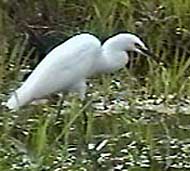Older stories on Resources News
Links to general resource, environmental sites
Links to non-profit environmental/resource groups
Links to environmental/resource news sources
E-mail Resources News
No Water, No Problem - Poachers Big Problem
Wading birds not harmed by extreme droughts - but many birds threatened by poaching.
First the good news. Although the Florida Everglades periodically experiences extreme droughts, the lack of water doesn't seem to have a negative, long term impact on the population of the many wading birds found there. In fact, a drought appears to result in a population boom.
White ibis and other birds spend their entire lives around water, foraging in it for fish and nesting in the grasses above it for protection against predators. To Peter Frederick, a wading-bird expert at the University of Florida Institute of Food and Agricultural Sciences, it seemed likely that dry conditions in the early 1990s would force the birds to fly to wetter places. Instead, he was surprised to see a surge in breeding pairs of white ibis, wood storks, snowy egrets and tricolor herons immediately following the drought.
"We thought there would be nothing, and it was the biggest year in 25 years," Frederick says in describing 1992, a boom year for wading birds in the Everglades. He believes that what happened that year is only the latest instance of wading-bird surges that occur in the aftermath of severe droughts - not only in the Everglades, but also worldwide among diverse wading bird populations.
He speculates the cause of this relates to how droughts affect the population dynamics of another water-dependent animal - fish. After the 1992 upsurge, he decided to probe the mystery using Everglades climate and nesting records dating back decades.
Two groups of years - 1931-1946 and 1974-1998 - were used because there were good records for consecutive seasons of nesting data for those years. The data showed that years that had many more breeding birds than the average occurred in the two years following seven of the eight severe droughts that occurred during those time spans. Many years had 10,000 or fewer nesting birds. But during surge years, there were as many as 150,000 birds.
Frederick hypothesizes this is because of the drought's impact on fish populations. In major droughts, there is so little water available that most big fish and the small fish they eat die. But the small fish typically have rapid life cycles - mosquito fish, for example, can reach maturity and breed in two months. By contrast, predator fish, such as largemouth bass, require at least 18 months to reproduce.
This means that, in the year or so following major droughts, there are no major predators going after small fish. As a result, they proliferate, creating lots of food for the ibis and other wading birds that eat them.
Although no long term damage appears to be done to bird populations by the effects of a drought, birds don't do as well when it comes to surviving delicacy seeking humans. One example if how bad the problem has become came to light late last year when a truck containing 120,000 birds killed in Serbia and Montenegro was stopped by Italian forestry officials. The haul included 40,000 quail and 10,000 skylark. There were also hundreds of song birds and dozens of rare and endangered species like the corncrake.
Many of the poached birds were intended to be the feature item on a restaurant plate. Hungary has asked the European Parliament to ban serving protected birds as delicacies in Italian restaurants to stop Italian hunters crossing to Hungary to kill them.
Another favoured destination for bird poachers is Yugoslavia. In one recent case involving Italian poachers, a car with 82 birds killed on Yugoslav territory was stopped on the Serbian-Hungarian border by Hungarian customs officials. Ten of the birds were protected species, hidden in a secret compartment in the door.
Since the mid-1990s Italian hunters have killed and smuggled out of the country tens of thousands of birds -- including larks, blackbirds and turtle-doves. In an effort to end the killing of rare and protected birds, Hungary plans to set up a nature protection squad.
